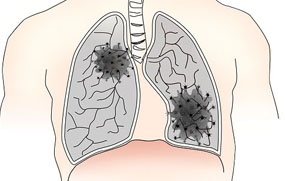Home page Description:
UHN study implicates cellular metabolism proteins in lung cancer
Posted On: February 16, 2015

Image Caption:
Only 15% of lung cancers are caught at an early stage. Once it has spread to other areas, the survival rate drops to 3.5%.
The American Cancer Society estimates that more than nine million people around the world will die from cancer in 2015. To date, there have been significant efforts made by scientists and clinicians worldwide towards identifying the many genetic mutations involved in cancer development. However, relatively little is known about how these may affect corresponding proteins and contribute to unregulated tumour growth.
PM Cancer Centre Affiliate Scientist Dr. Michael Moran led a team of researchers, including Drs. Ming-Sound Tsao, Thomas Kislinger and Frances Shepherd, in a large-scale study aimed at examining the proteins in cancerous versus normal lung tissue. To accomplish this, they used ultrahigh-resolution protein mass spectrometry, a tool that can measure the type and concentration of proteins that exist within a sample. They identified a series of proteins, called ‘protein signatures’, that are involved in cellular metabolism, and which were consistently observed in non-small cell lung carcinoma (NSCLC) subtypes (adenocarcinoma, squamous cell carcinoma). SHMT2 (a protein involved in metabolism from one of these signatures) levels were consistently increased in NSCLC tumours. Moreover, SHMT2 is part of a protein signature known to be associated with poor outcomes in adenocarcinoma.
This study provides critical new information that could not have been predicted by genetics alone about how these protein signatures link cancer metabolism and overall survival in lung cancer. Dr. Moran says, “Our next step will be to figure out how these protein signatures act to promote cancer, which is the next phase towards developing more targeted anticancer drugs.”
This work was supported by the Canada Research Chairs Program, the Ontario Research Fund, the Canadian Institutes of Health Research, the Canadian Cancer Society Research Institute, the Ontario Ministry of Health and Long-Term Care and the Princess Margaret Cancer Foundation.
Integrated omic analysis of lung cancer reveals metabolism proteome signatures with prognostic impact Li L, Wei Y, To C, Zhu CQ, Tong J, Pham NA, Taylor P, Ignatchenko V, Ignatchenko A, Zhang W, Wang D, Yanagawa N, Li M, Pintilie M, Liu G, Muthuswamy L, Shepherd FA, Tsao MS, Kislinger T, Moran MF. Nat Commun. 2014 Nov 28 [Pubmed Abstract]
PM Cancer Centre Affiliate Scientist Dr. Michael Moran led a team of researchers, including Drs. Ming-Sound Tsao, Thomas Kislinger and Frances Shepherd, in a large-scale study aimed at examining the proteins in cancerous versus normal lung tissue. To accomplish this, they used ultrahigh-resolution protein mass spectrometry, a tool that can measure the type and concentration of proteins that exist within a sample. They identified a series of proteins, called ‘protein signatures’, that are involved in cellular metabolism, and which were consistently observed in non-small cell lung carcinoma (NSCLC) subtypes (adenocarcinoma, squamous cell carcinoma). SHMT2 (a protein involved in metabolism from one of these signatures) levels were consistently increased in NSCLC tumours. Moreover, SHMT2 is part of a protein signature known to be associated with poor outcomes in adenocarcinoma.
This study provides critical new information that could not have been predicted by genetics alone about how these protein signatures link cancer metabolism and overall survival in lung cancer. Dr. Moran says, “Our next step will be to figure out how these protein signatures act to promote cancer, which is the next phase towards developing more targeted anticancer drugs.”
This work was supported by the Canada Research Chairs Program, the Ontario Research Fund, the Canadian Institutes of Health Research, the Canadian Cancer Society Research Institute, the Ontario Ministry of Health and Long-Term Care and the Princess Margaret Cancer Foundation.
Integrated omic analysis of lung cancer reveals metabolism proteome signatures with prognostic impact Li L, Wei Y, To C, Zhu CQ, Tong J, Pham NA, Taylor P, Ignatchenko V, Ignatchenko A, Zhang W, Wang D, Yanagawa N, Li M, Pintilie M, Liu G, Muthuswamy L, Shepherd FA, Tsao MS, Kislinger T, Moran MF. Nat Commun. 2014 Nov 28 [Pubmed Abstract]





Comments